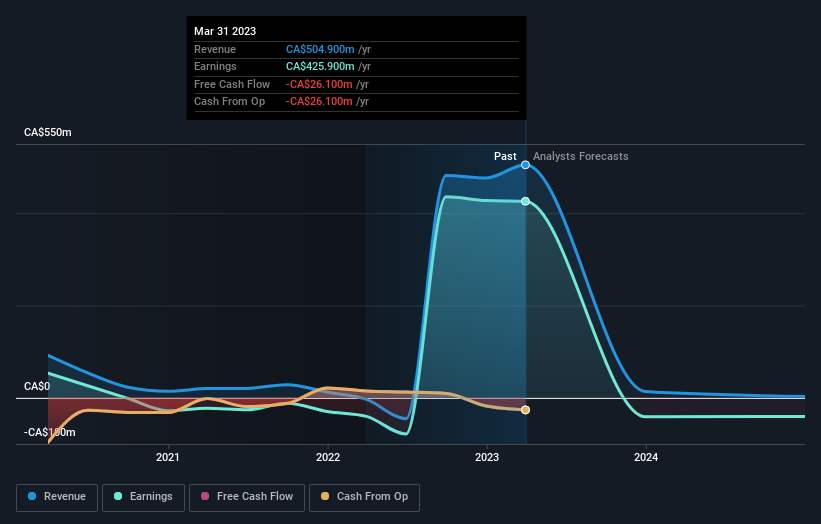Aimia Inc.'s (TSE:AIM) largest shareholders are retail investors with 53% ownership, institutions own 38%
Key Insights
Significant control over Aimia by retail investors implies that the general public has more power to influence management and governance-related decisions
A total of 23 investors have a majority stake in the company with 47% ownership
Every investor in Aimia Inc. (TSE:AIM) should be aware of the most powerful shareholder groups. And the group that holds the biggest piece of the pie are retail investors with 53% ownership. Put another way, the group faces the maximum upside potential (or downside risk).
Meanwhile, institutions make up 38% of the company’s shareholders. Generally speaking, as a company grows, institutions will increase their ownership. Conversely, insiders often decrease their ownership over time.
In the chart below, we zoom in on the different ownership groups of Aimia.
See our latest analysis for Aimia
What Does The Institutional Ownership Tell Us About Aimia?
Institutional investors commonly compare their own returns to the returns of a commonly followed index. So they generally do consider buying larger companies that are included in the relevant benchmark index.
As you can see, institutional investors have a fair amount of stake in Aimia. This implies the analysts working for those institutions have looked at the stock and they like it. But just like anyone else, they could be wrong. If multiple institutions change their view on a stock at the same time, you could see the share price drop fast. It's therefore worth looking at Aimia's earnings history below. Of course, the future is what really matters.
It looks like hedge funds own 5.9% of Aimia shares. That catches my attention because hedge funds sometimes try to influence management, or bring about changes that will create near term value for shareholders. Mithaq Capital is currently the largest shareholder, with 31% of shares outstanding. Edgehill Partners is the second largest shareholder owning 5.9% of common stock, and azValor Asset Management SGIIC, S.A.U. holds about 3.4% of the company stock. Furthermore, CEO Philip Mittleman is the owner of 1.8% of the company's shares.
A deeper look at our ownership data shows that the top 23 shareholders collectively hold less than half of the register, suggesting a large group of small holders where no single shareholder has a majority.
While it makes sense to study institutional ownership data for a company, it also makes sense to study analyst sentiments to know which way the wind is blowing. There is a little analyst coverage of the stock, but not much. So there is room for it to gain more coverage.
Insider Ownership Of Aimia
The definition of company insiders can be subjective and does vary between jurisdictions. Our data reflects individual insiders, capturing board members at the very least. The company management answer to the board and the latter should represent the interests of shareholders. Notably, sometimes top-level managers are on the board themselves.
I generally consider insider ownership to be a good thing. However, on some occasions it makes it more difficult for other shareholders to hold the board accountable for decisions.
We can see that insiders own shares in Aimia Inc.. As individuals, the insiders collectively own CA$8.5m worth of the CA$270m company. This shows at least some alignment. You can click here to see if those insiders have been buying or selling.
General Public Ownership
The general public -- including retail investors -- own 53% of Aimia. This level of ownership gives investors from the wider public some power to sway key policy decisions such as board composition, executive compensation, and the dividend payout ratio.
Next Steps:
While it is well worth considering the different groups that own a company, there are other factors that are even more important. Consider for instance, the ever-present spectre of investment risk. We've identified 2 warning signs with Aimia , and understanding them should be part of your investment process.
If you would prefer discover what analysts are predicting in terms of future growth, do not miss this free report on analyst forecasts.
NB: Figures in this article are calculated using data from the last twelve months, which refer to the 12-month period ending on the last date of the month the financial statement is dated. This may not be consistent with full year annual report figures.
Have feedback on this article? Concerned about the content? Get in touch with us directly. Alternatively, email editorial-team (at) simplywallst.com.
This article by Simply Wall St is general in nature. We provide commentary based on historical data and analyst forecasts only using an unbiased methodology and our articles are not intended to be financial advice. It does not constitute a recommendation to buy or sell any stock, and does not take account of your objectives, or your financial situation. We aim to bring you long-term focused analysis driven by fundamental data. Note that our analysis may not factor in the latest price-sensitive company announcements or qualitative material. Simply Wall St has no position in any stocks mentioned.

 Yahoo Finance
Yahoo Finance 

